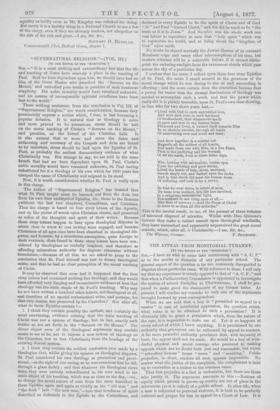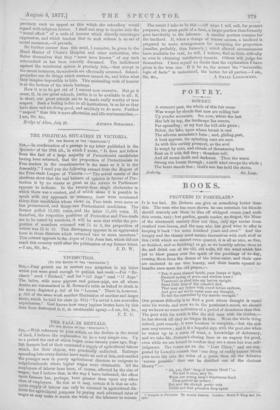THE APPEAL FROM MONITORIAL TYRANNY.
(TO THE EDITOR OF Tau "SPECTATOR.") SIR,—I have no wish to enter into controversy with "A. C. P." as to the merits or demerits of any particular school. The general aspect of the question is far too commonly disregarded in disputes about particular cases. With reference to these, I will only say that my experience is utterly opposed to that of "A. C. P.," and that when a Parliamentary Commission is appointed to investigate the system of school discipline at Charterhouse, I shall be pre- pared to make good the statements of my former letter. At present I will confine my remarks to only one of the arguments brought forward by your correspondent. When we are told that a boy is "permitted to appeal to a master" in case of monitorial oppression, the question arises, what value is to be attached to such a permission? It is obviously idle to grant a permission which, from the nature of the ease, it is impossible to make use of. Yet it so happens at every school of which I know anything. It is proclaimed by one authority that grievances can be redressed by appeal to masters. A far more powerful authority proclaims that, with impunity at least, the appeal shall not be made. He would be a boy of won- derful physical and moral courage who persisted in making appeals which are no doubt both just and reasonable, but which "schoolboy honour" terms " mean " and "sneaking." Public prejudice, in short, renders all such appeals impossible. No matter what the justice of the complaint, the complainant is held up to execration as a traitor to the common cause.
That this prejudice is a fact is undeniable, but there are those who justify it. The argument amounts to this :—Notions of equity which prevail in grown-up society are out of place in the microcosm (as it is called) of a public school. In after-life, when a man is subjected to personal violence, it is held to be perfectly rational and proper for him to appeal to a Court of Law. It is precisely such an appeal as this which the schoolboy would regard with religious horror. I shall not atop to inquire into the "moral effect" of a code of honour which directly encourages' Oppression, and which teaches that to seek redress is an act of moral meanness,—it prevails.
No further answer than this need, I conceive, be given to the
• Head Master of Christ's Hospital and other authorities, who flatter themselves that they "must have known " of any such misconduct as has been recently discussed. The indictment against the monitorial system is precisely this,—that except in the rarest instances, its misdeeds arc effectually screened. School- prejudice can do things which masters cannot do, and hides what they imagine impossible to hide. This misleading code of honour is at the bottom of the whole business.
How it is to be got rid of I cannot now conceive. But go it must, if, in our great schools, justice is to be available to all ; if, in short, our great schools are to be made really worthy of true respect. Such a feeling is due to all institutions, in so far as they have done and are doing good, and are likely to do more. Further " respect " than this is mere affectation and idle sentimentalism.— I am, Sir, &c.,



































 Previous page
Previous page